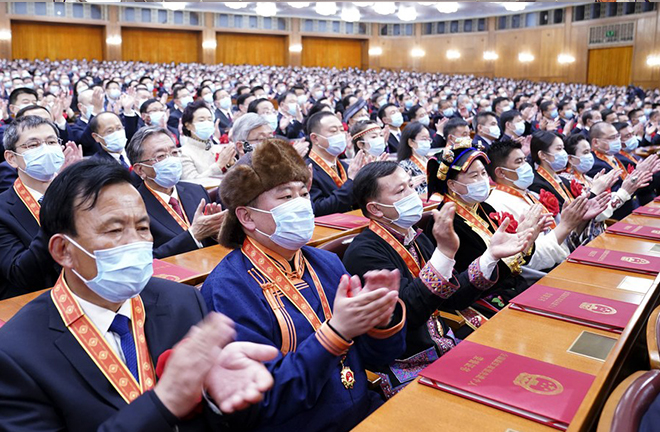China eradicates absolute poverty

A grand gathering is held to mark China’s accomplishments in poverty alleviation and honor its model poverty fighters at the Great Hall of the People in Beijing, Feb. 25. Photo: Yan Yan/XINHUA
Chinese President Xi Jinping announced on Feb. 25 that China has secured a “complete victory” in its fight against poverty.
Xi, also general secretary of the Communist Party of China (CPC) Central Committee and chairman of the Central Military Commission, said absolute poverty has been eradicated in the world’s most populous country, home to over 1.4 billion people.
Xi made the announcement while addressing a grand gathering held in the Great Hall of the People in Beijing to mark the nation’s poverty alleviation accomplishments and honor model poverty fighters.
At Thursday’s gathering, Xi presented medals, certificates and plaques to role models from the country’s anti-poverty fight. He also joined other Chinese leaders in presenting awards to individuals and groups for their outstanding achievements in the fight against penury.
The recipients included villagers, Party members dispatched to villages to fight poverty, grassroots officials, and college researchers. Some of them were honored posthumously.
The leading Party members’ group from the Chinese Academy of Social Sciences (CASS) attaches great importance to fixed-point poverty alleviation. The Rural Development Institute at CASS, honored as a national model for poverty alleviation, has long been committed to anti-poverty theoretical research and practice.
Xia Sen, a national model of poverty alleviation and a retired cadre of CASS, has always been concerned about education in poverty-stricken areas. She has donated 2.032 million yuan of her savings to improve the teaching conditions in poverty-stricken areas of Danfeng County, Shaanxi Province and Shangyou County, Jiangxi Province. The establishment of the “Xia Sen Scholarship” has now supported the college education of 182 underprivileged students.
Wei Houkai, director of the Rural Development Institute at CASS, said that since the reform and opening up, China has not only achieved the world’s fastest economic growth, but also the world’s largest poverty reduction, contributing more than 70% of global poverty reduction. The country has created a “Chinese miracle” in the history of world poverty reduction.
Over the past eight years, the final 98.99 million impoverished rural residents living under the current poverty line have all been lifted out of poverty. All 832 impoverished counties and 128,000 villages have also been removed from the poverty list.
China met the poverty eradication target set in the United Nations’ 2030 Agenda for Sustainable Development ten years ahead of schedule, said Xiang Deping, a professor from the School of Sociology at Huazhong University of Science and Technology. China’s decisive achievement in the fight against poverty has accelerated the world’s poverty reduction process.
Lin Mingang, a professor from the School of Government at Nanjing University, said that China’s poverty governance is a process of vigorously introducing social forces, improving the participation mechanism, and realizing the transformation of poverty governance from a passive to an active approach, and from low efficiency to high efficiency. The legislative process has advanced gradually, shifting the focus from policies to institutional design to facilitate poverty alleviation.
“After the elimination of absolute poverty, the problem of unbalanced development still exists in our country. Some regions are relatively backward, and some people are at a relatively low-income level,” said Lu Hanwen, director of the Institute of Poverty Reduction and Development in Central China at Central China Normal University.
The governance of relative poverty is a long-term task, and it is a systematic project involving economic, political, cultural, social, and ecological areas, Lin said.
Lu called for the establishment and improvement of a long-term mechanism for the endogenous development of poverty-stricken people in poverty-stricken areas, to further improve basic production and living conditions in these areas.
Lu also suggested striking a balance between efficiency and fairness in the process of rural vitalization, giving preferential support to underdeveloped areas, and exploring long-term mechanisms for coordinated development in different regions. It is important to establish and improve the poverty impact assessment system for major policies and major projects, and prioritize the introduction or implementation of policies and projects that help narrow development gaps between different regions and different groups of people.
Edited by JIANG HONG
